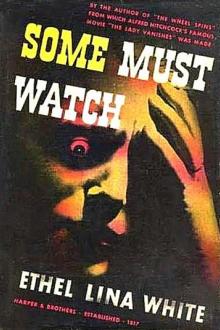Some Must Watch by Ethel Lina White (books for 5 year olds to read themselves .TXT) 📕

- Author: Ethel Lina White
- Performer: -
Book online «Some Must Watch by Ethel Lina White (books for 5 year olds to read themselves .TXT) 📕». Author Ethel Lina White
She must not let Lady Warren scream. If the Professor was startled in
his drugged sleep, there might be danger of shock to his brain. It would
be cruel, too, to alarm Miss Warren, while she was imprisoned.
Besides—the whisper stirred, like a snake, in her brain—it might attract
someone else.
As she lingered, Lady Warren’s mind apparently wandered.
“There’s a storm blowing up,” she said. “It’s growing dark.”
With a sharp pang of alarm, Helen realized that the room seemed to have
become actually dimmer. She rubbed her eyes, but the illusion did not
vanish. The electric-light was gleaming murkily, as through a slight
fog.
Her lips grew stiff, as she wondered if this were a prelude to complete
darkness.
One more feature of the thrill-drama had arrived, with the same
suggestion of cumulative effect.
“It’s getting nearer,” she thought fearfully.
In spite of her resolution, she shared her doubt with her companion.
“Someone’s tampered with the fuses,” she whispered.
Lady Warren snorted.
“The batteries are running out, idiot,” she snapped.
Helen gratefully grasped at the commonplace explanation. Oates was
responsible for the power-plant, and he was notoriously idle. In her
nervous dread of being alone in the darkness, she had recklessly
switched on nearly every light, without a thought of possible shortage.
“I’d better snap off most of the lights,” she said. “Yes,” nodded Lady
Warren. “Fetch candles, too. We can’t be left in the dark.”
Helen looked around her for candles, only to realize that these were
used exclusively for domestic purposes, in the basement. She remembered
seeing bundles in the storeroom, which was next to the larder.
“Do you mind being left?” she asked. “I must go now, before—”
Unable to contemplate a complete extinction, she rushed out of the room
and down the stairs. The hall seemed to flicker, as she passed through,
as though the house were sighing. It was warning her not to delay; in a
panic, lest she should have to grope her way through darkness, she
leaped down the kitchen stairs, like a scared antelope.
Mrs. Oates still slept in her chair, apparently peaceful as a good
child. As she passed, Helen touched her cheek, and found that it was
warm.
“Thank Heaven, there’s a special Providence to look after children and
drunks,” she thought.
In the passage, a spiral of red wire gleamed through the pear-shaped
hanging bulb, and the light was so dim that Helen held her breath. As
she dashed into the store room, she expected, every minute, to be
plunged in darkness, and the horror of Murder Lane.
Snatching the candles, she rushed back, laying a black trail, as she
snapped off each light. When she reached the hall, she repeated the
operation, in each reception-room. But, while she knew that she was
doing the only sensible thing, she vaguely felt that she was in the grip
of a horrible fatalism, which ordained that she should deliberately
blind the house.
Even as the thought crossed her mind, the oasis of light in which she
lingered Was suddenly swallowed up by the surrounding shadows.
The eclipse was but momentary. With the next second, the hall flickered
back again; but the work of demoralization was done.
The house had given a signal to the night. So intense was her fear of
it, that Helen felt a mad temptation to rush out into the night, and
take her chance in the open.
Captain Bean would give her, shelter; his cottage was, only a short
distance away, if she cut through the plantation. The trees no longer
held any terror, while she welcomed the thought of the wind and the rain
dashing in her face. The savage landscape had become sanctuary, because
the real menace was inside—hidden somewhere in the house.
She was on the point of unbolting the front door, when she remembered
the helpless inmates of the Summit. Lady Warren, the Professor, and Mrs.
Oates were unable to protect themselves. When the maniac found his prey
had escaped, he might wreak his disappointed fury upon them.
With the feeling that she was going to her doom, she returned to the
landing. After a pause, to recover her nerve, she pushed open the door
of the blue room.
Nothing appeared to have happened in her absence. Lady Warren sat humped
up, in bed, almost swamped in ultramarine shadows.
“You’ve been gone a long time, girl,” she grumbled. “Light the candles.”
There were no candle-sticks, so Helen dropped melted wax upon a marble
mantel-shelf, and fixed two candles in position, before the mirror.
“They look like corpse-candles,” remarked Lady Warren.
“I want more. All of them.”
“No, we must keep some in reserve,” Helen told her.
“They’ll last our time.”
Although the finality of the old woman’s voice sounded ominous, Helen
was aware of a change in her. Her eyes were opened wider, and they
gleamed with satisfaction, as she held up one bony hand.
“Look,” she cried. “It doesn’t shake. Feel how strong my fingers are.”
As Helen crossed to the bed, she forgot her invitation.
“I’m going to sleep,” she said. “Don’t leave me, girl.”
She closed her lids, and very soon her chest rose and fell with the
regularity of a machine, while her breathing was quiet and regular. It
was an extraordinary example of concentration and will-power, for Helen
was sure that she had actually lost consciousness.
“I wonder if I shall see her awake again,” she thought.
She felt as though the last link of connection with the finite world had
snapped. In the course of the night, she bad witnessed the temporary
flight of so many spirits, each slipping away, where she could not
follow them.
Although her own lids seemed weighted with lead, she, alone, was awake
in a sleep-bound world. She had to watch.
Suddenly she sprang to her feet, her heart leaping with terror. Someone
was moving in the dressingroom. She distinctly heard the sound of
footsteps, and stealthy movements.
Stealing across the carpet, she opened the door an inch, revealing a
crack of light, blocked by the dark figure of a man.
Even as criminals give themselves up to justice, she knew she could bear
no longer the torture of suspense. Screwed up to a pitch of desperate
courage, she flung open the door.
To her joy and surprise, she saw the Professor standing at the small
bureau. At the sight of the familiar formal figure, everything grew safe
and normal again. The house ceased to sway and gape, as the walls closed
together, in the security of a fortress.
She fought to keep back her tears, for the relief of having rational
company again was almost overpowering. But the Professor’s glacial eye
checked her hysteria.
“Oh, Professor,” she cried. “I’m so glad you’re all right again.”
“I am unaware that anything was wrong.” The Professor spoke coldly. “I
merely procured some necessary sleep.”
Something had annoyed him, for he frowned as he opened another empty
drawer.
“Where is the nurse?” he asked.
“Gone,” replied Helen, feeling incapable of lucid explanation.
“Where has she gone?”
“I don’t know. Perhaps, she’s hiding in the house.”
“She—or someone else—has taken something of mine, which I am anxious
to find. But it doesn’t matter, for the present.”
As though struck by some recollection, he turned round and faced Helen.
“How did you get back to the house?” he inquired.
She did not understand the question.
“When?” she asked.
“When you were coming through the plantation. I heard your footsteps. I
waited… But you never came.”
At the words, suddenly—Helen knew.
“You,” she said.
GOOD HUNTING
Helen knew…
The acid of terror cleared the scum from her mind, so that she felt a
rush of mental activity. Every cell in her brain seemed to be on fire,
as—in a succession of films, reel ing through her mind—she saw the
whole story, in one ghastly moment of realization.
Professor Warren had strangled those five girls, even as his father,
before him, had murdered two servants. Only Lady Warren knew of the
crimes and had fulfilled the Law. After the death of the second maid,
she had shot her husband.
But, since then, she had grown old, and her brain had greened, so that
she babbled of trees. She believed it to be her repulsive duty to shoot
the son—but she kept putting it off. After each murder, she told
herself that it was the last; and, still, there had been another one.
But with the arrival of a new girl at the house she had smelt danger.
Her suspicions were aroused, and she tried to protect Helen. She wanted
to keep her in her room, where she would be safe.
When she had asked the Professor to light her cigarette, she had looked
into his eyes, and seen the toofamiliar glow, which warned her that he
had committed another crime. Yet, in spite of this, she wished to save
him from the Police. She had got up, secretly, and searched his room,
for any incriminating object.
Then—she had found the scarf.
Helen felt a rush of gratitude towards the old woman, even though
nothing mattered now.
“I’m glad I took her part against the nurse,” she thought. Yet Nurse
Barker, too, was revealed in a new light—as deserving of pity, rather
than suspicion. The spirit of an intensely feminine woman—craving
admiration—had been encased in an unattractive envelope. Her natural
instincts had been thwarted, and she had soured into a bully.
Helen wondered uneasily what had become of her. At this crisis, she
longed for the aid of the masculine strength and brutality from which
she had shrunk.
She looked at the Professor with incredulous eyes. Outwardly, she saw no
change in him. He appeared grey, bleak, and intellectual—a civilized
product, used to dressing-gongs and finger-bowls. His formal
evening-dress completed the illusion, while his voice had preserved its
frigid academic accent.
She could not fear him—as he was. What she dreaded, in every fibre and
bone, was the transformation to come. She remembered how Dr. Parry had
told her that, in between his fits of mania, the criminal was normal.
She did her best to hold him in this familiar guise.
“What were you looking for?” she asked, forcing her voice to sound
casual.
“A white silk scarf.”
The reply drained the blood from her heart.
“I saw it in Lady Warren’s drawer,” she said quickly.
“I’ll get it for you.”
For a second a mad hope flared up that she might yet make a dash into
the open. It died instantly, as the Professor shook his head.
“Don’t go. Where are the others?”
“Mrs. Oates is drunk, and Miss Warren is locked in her room,” replied
Helen.
A faint smile of satisfaction flickered around his lips.
“Good,” he said. “At last I have you, alone.” His voice was still so
detached and self-controlled that Helen did her best to keep him
interested.
“Did you plan this?” she asked.
“Yes,” replied the Professor, “and no. I merely touched the spring which
set the machinery in motion. It has been rather amusing to sit still and
watch others clear the way for me.”
Helen remembered the drift of the conversation at dinner. The Professor
had proved his theory that a clever man could direct the actions of his
fellows. He had set himself up above God.
“What do you mean?” she asked,





Comments (0)